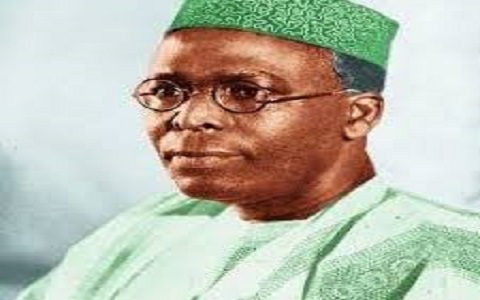

He played a prominent role in ensuring that Nigeria achieved full independence from Britain in 1960.
The outstanding drive earned him the grace to be the first person that was not a president but received the honor of Grand Commander of Federal Republic, GCFR.
He is the late Chief Obafemi Awolowo
In this report, Adedayo Adelowo x-rays roles played by the late sage Chief Obafemi Awolowo as Nigeria commemorates fifty ninth independence.
In this report, Adedayo Adelowo x-rays roles played by the late sage as Nigeria commemorates fifty ninth independence.
It will be difficult to isolate Chief Obafemi Awolowo’s effort from the collaboration of other key players across the Niger in gaining Nigeria’s independence, but there is no doubt that Pa Awolowo played a major role in getting the nation to self-governance.
Obafemi Awolowo, born in Ikenné, Western State, Nigeria, on March 6, 1909, received his early education in the mission schools of Ikenné, Abeokuta, and Ibadan.
He had work experience as journalist, teacher, clerk, moneylender, taxi driver and produce broker and completed a university of London correspondence course for the bachelor of commerce degree
During his residence in London, Awolowo moved to a position of prominence in the struggle for Nigerian independence.
In 1945 he wrote his first book, path to Nigerian freedom, in which he was highly critical of British policies of indirect administration and called for rapid moves towards self-government and Africanization of administrative posts in Nigeria.
He also expressed his belief that federalism was the form of government best suited to the diverse populations of Nigeria, a position to which he consistently adhered.
In 1950 Awolowo founded and organized the action group political party in western Nigeria to participate in the western regional elections of 1951.
The action group’s platform called for immediate termination of British rule in Nigeria and for development of various public welfare programs, including universal primary education, increase of health services in rural areas, diversification of the western regional economy, and democratization of local governments.
The action group won a majority, and in 1952 Awolowo as president of the action group became leader of the party in power in western Nigeria. In 1954 he became the first premier of the western region, on which occasion he was awarded an honorary chieftaincy
In 1959, he published his second book, Awo: an autobiography of Chief Obafemi Awolowo, in which he once more endorsed federalism as the most appropriate form of government for Nigeria. He also outlined the successful history of the action group and was optimistic of Nigerian independence.
He played a major role in the constitutional conferences in London and Lagos that paved the way for independence.
Attesting to the significant feats achieved by the late icon for the independence is a political scientist, emeritus Professor Bunmi Ayoade who said “awo” as he was fondly called lived for the freedom of Nigeria.
On his part, an elder statesman, chief Areoye Oyebola who hinted that he had personal relationship with the late sage said Awolowo had a dream of a better Nigeria and pursued it during his life time.
Chief Oyebola explained that if not for the doggedness of Awolowo coupled with efforts of other nationalists Nigeria’s independence might not come to reality as at 1960.
A septuagenarian and a political activist, Dr. Olapade Agoro maintained that the late Awolowo, like people of his time was educated, exposed and had zero tolerance for colonialism.
Dr. Agoro however implored the leaders to ensure that the freedom fought for by the nationalists should respected and maintained through human friendly policies for the citizenry.
Adedayo Adelowo